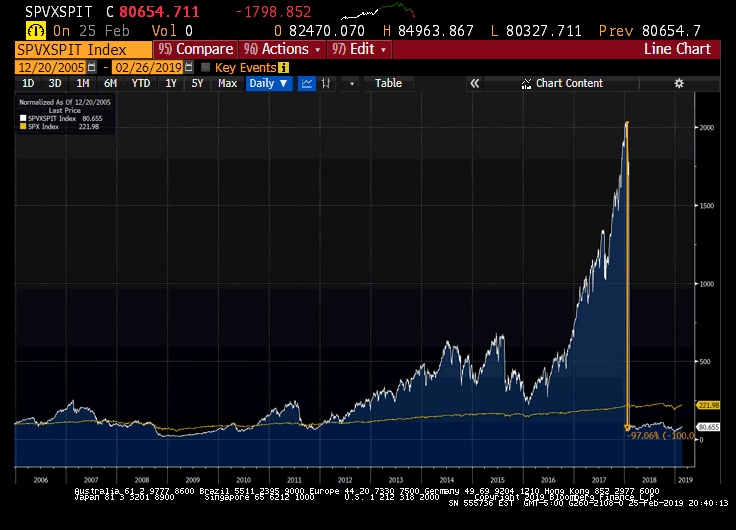Why Some Investments Don’t Work
Those of you who own a cell phone or car know that nothing lasts forever.
The older we get, the more we may realize that’s also true when it comes to our bodies.
But when we get sick or break a bone, while it’s terrible, we can usually quickly figure out the cause.
In-regard to the physical things we purchase, it can be frustrating when things that were designed to work a certain way, or last for a while, simply don’t.
Just ask future “household name” and Duke basketball phenom, 18-year old Zion Williamson, whose shoe literally disintegrated during a game last week, causing him to slip and injure his knee.
It’s safe to say that almost no one saw that coming.
Shoes? Our bodies? Cell phones? I wish it weren’t so, but all these things have a predictably-limited shelf life.
But what happens when your investments don’t work?
How is it possible that something that is so important to so many people; that uses a combination of science, data analysis and research, and which has been created by humans, expressly for humans, still doesn’t always work?
Rest assured, even professional investors and trillion-dollar asset managers feel a sense of frustration much more often than most would care to admit.
We need to remember that physics simply cannot be consistently applied to the markets. Investors are human beings and markets mirror our behavior and we participants often act irrationally.
With this in mind, let’s explore some things (aside from “losing money or value”) that can go wrong with an investment.
Here are three.
1) Process
This is where we almost always begin.
Whenever you hire a manager, you need to sift through all the marketing noise and get down to the process. Some things to consider, include:
- How has the process changed over time?
- What is the manager’s philosophy on risk?
- Will the process work better in some market environments than others?
- What is the kryptonite of the process?
- How about the best environment for the process?
- What types of people and professionals are supporting the process?
- What are the expenses and fees and how are they used?
Just remember, if a manager has followed a model for 10 years, but now wants to unfollow it, this, in our minds, is a broken process.
For instance, if a deep-value manager is now changing their tune and managing “growth stocks,” but trying to make it appear that they are still a “value manager,” this is also a warning sign about a potentially bad process.
2) Style (approaches)
Some styles work well when the markets drop but perform poorly when the market is surging.
The point of these strategies or styles is to reduce the correlation or co-movement with the market. If we can reduce the correlation, we also get to reduce risk.
No single strategy works for everyone.
Rather than limit both the upside and the downside, some would rather ride the market up and ride it back down.
Other styles can be viewed as insurance. There is a cost for it, but there is also a benefit. Sometimes, a style doesn’t always work in every market environment. That doesn’t mean it’s broken, though. Factors such as Value, Momentum, Quality, and Low Volatility have been shown to work over time.
But that certainly doesn’t mean they work every time. There may, in fact, be long periods where they may not work at all. (And this is the reason why they continue to work some, much or most of the time.) Because if they worked all the time, the landscape (trades) would get crowded and traders and other investors would arbitrage the opportunity away and the efficacy would cease.
3) Product Design
The good news is that there is innovation in the financial services industry and a large push to bring down costs.
The bad news is that there’s a plethora of products out there, some of them created by marketing departments of large Wall Street firms that are more anxious to make a quick buck than help you with your investment goals.
Often, the products are designed for institutional investors or professional traders. (The 2X inverse and 3X bullish or bearish products were never meant to be used by individual investors as a “buy and hold” investment.)
One such product design that broke roughly a year ago were the Inverse VIX products. These took a short position in short-term VIX futures with a daily rebalance (see Exhibit 1).
In the simplest of terms, these products work until they don’t. There are other products that aren’t trading vehicles, but that pay exorbitant commissions to advisors and lock up investors for 15 years, or longer. These are just as bad, if not, worse.
No, they’re not exactly broken. But we think they are often horribly designed and marketed by unscrupulous salespeople.

Exhibit 1
Summary
To wrap it all up, there may be times when you are tempted to think that a certain investment strategy is completely broken. While it might be broken, it could be that the product isn’t being used for its intended purpose.
Before we discard it, let’s first examine if it is a problem with process, style, or product design.
Then you can make a more informed decision. Just remember, your advisor should always put your best interests first.
Conversely, there are also times when we need to be educated by a professional to gain clarity. This can alleviate your concerns that something is broken and can also help you get refocused on the goal.
If you have questions about your investment or savings allocation or strategy, please contact us today.
Source: Charts and data referenced here come from Bloomberg.
The S&P 500® VIX® Short-Term Futures Inverse Daily Index is designed to measure the performance of the inverse of the S&P 500 VIX Short-Term Futures Index, which utilizes prices of the next two near-term VIX futures contracts to replicate a position that rolls the nearest month VIX futures to the next month on a daily basis in equal fractional amounts. You cannot directly invest in an index.
Past performance does not guarantee future results. Any stock market transaction can result in either profit or loss. Additionally, the commentary should also be viewed in the context of the broad market and general economic conditions prevailing during the periods covered by the provided information. Market and economic conditions could change in the future, producing materially different returns. Investment strategies may be subject to various types of risk of loss including, but not limited to, market risk, credit risk, interest rate risk, inflation risk, currency risk and political risk.
This commentary has been prepared solely for informational purposes, and is not an offer to buy or sell, or a solicitation of an offer to buy or sell, any security or instrument or to participate in any particular trading strategy or an offer of investment advisory services. Investment advisory and management services are offered only pursuant to a written Investment Advisory Agreement, which investors are urged to read and consider carefully in determining whether such agreement is suitable for their individual needs and circumstances.
Hanson McClain Advisors and its affiliates and its employees may have positions in and may effect transactions in securities and instruments mentioned in these profiles and reports. Some of the investments discussed or recommended may be unsuitable for certain investors depending on their specific investment objectives and financial position.
Hanson McClain Advisors is an SEC-registered investment advisor that provides advisory services for discretionary individually managed accounts. To request a copy of Hanson McClain Advisors’ current Form ADV Part 2, please call our Compliance department at 916-482-2196 or via email at compliance@hansonmcclain.com.
February 25, 2019
Give yourself an advantage. Sign up to receive monthly insights from our Chief Investment Officer, and be the first to know about upcoming educational webinars. You'll also get instant access to our retirement planning checklist.
 January 12, 2024
Fourth Quarter 2023 Market Update
January 12, 2024
Fourth Quarter 2023 Market Update
Allworth's Co-CEO Scott Hanson and Chief Investment Officer Andy Stout team up for this fourth quarter 2023 market update video.
Read Now December 15, 2023
December 2023 Market Update
December 15, 2023
December 2023 Market Update
Chief Investment Officer Andy Stout takes a look back on the year to help give perspective to what's on the horizon in 2024. At the beginning of this …
Read Now November 17, 2023
November 2023 Market Update
November 17, 2023
November 2023 Market Update
Chief Investment Officer Andy Stout examines whether there’s a chance the US dollar will lose its status as the world’s reserve currency. There is a …
Read Now
